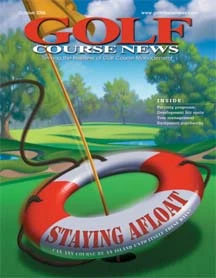Assistant superintendent program labeled a success
How do you climb to the next level of your career? Assistant golf course superintendents were excited to absorb knowledge to help answer that question during the inaugural Green Start Academy hosted by Bayer Environmental Science and John Deere Golf & Turf. Forty-nine assistants from throughout the country attended the event held in Clayton and Fuquay-Varina, N.C.
|
|
The two-day educational and networking event provided an arena for assistants to learn about best management practices and innovative products, meet industry experts and network with peers. Workshop topics included:
· Water management and conservation;
· Fertilization and the environment;
· Communicating to the media;
· Disease and formulations;
· Herbicides and insecticides;
· Professionalism and leadership;
· Pedigree of a pesticide;
· Effective height of cut versus bench height of cut;
· Plant health care;
· Aerating, verticutting and topdressing; and
· Turf research maintenance versus golf turf maintenance.
In addition to workshops and networking activities, attendees also toured Bayer Environmental Science’s research and development training center and the John Deere Turf Care factory.
|
|
Assistants didn’t expect much heading into the event, but left impressed and satisfied. Andrew Reynolds, Steve Houlihan and Tyler Otero all recommend the Green Start Academy to other assistants who want to further their careers.
Reynolds, assistant superintendent at the 27-hole Briar Ridge Country Club in Schererville, Ind., says the big thing about these types of programs is meeting people.
“Networking is something a lot of assistants forget about,” he says. “Overall, it was excellent, although at times it felt a little rushed. The first day was a load, but they gave us plenty of time to intermingle and pick each other’s brains.”
Houlihan, assistant superintendent at the 18-hole Merrill Hills Country Club in Waukesha, Wis., says he came to the event expecting to learn how Bayer produces, tests, researches and applies its product. He found it informative and rewarding because of the wide array of speakers, which included Bruce Williams, CGCS, director of golf courses and grounds at the Los Angeles Country Club; Bob Farren, CGCS, from Pinehurst Resort in North Carolina; Stan Zontek, director of the USGA Green Section’s Mid-Atlantic region; and Grady Miller, turf specialist at N.C. State University.
But most important for Houlihan was talking to other assistants from other parts of the country and discussing problems they’re experiencing.
“It was a good opportunity to network,” he says. “Bruce Williams’ talk about leadership was rewarding. ‘Image’ basically describes the two days in one word. That’s what will get you to the next level. I received good guidance and input from other leaders in the industry.”
|
|
Houlihan says the only thing he would have liked to have seen more of is Bayer’s lab work and what goes into its products. His biggest take away is to keep learning.
“We know grass has its limits, but it’s up to us to learn more about the business side,” he says.
Otero, assistant golf course superintendent at Trump National Bedminster in New Jersey, says he wasn’t sure what to expect other than learning a few things and meeting people from all throughout the country. Like Houlihan, he liked Williams’ talk about leadership and where the industry is headed.
“Every speaker was different which made it nice,” he says. “There was first-class treatment. Everyone is looking for the next step in their careers. No one seems to be complacent with their jobs. Agronomically, everyone is dealing with environment and using less chemicals. It was good to see everyone there.”
|
|
Another veteran in attendance, Ken Mangum, director of golf courses and grounds at the Atlanta Athletic Club, says Nick Hamon’s presentation about what it takes to bring a pesticide to market is important and highlights the need for new products. Hamon is director of developmental and technical services for Bayer.
“Giving assistants the big picture is valuable,” Mangum says. “It will pay dividends when they make purchasing decisions in the future.”
The event organizers were pleased as well.
“We consider the first Green Start Academy a great success,” says Matt Armbrister, brand communications manager, John Deere One Source. “Attendees reported great interest and overall satisfaction with the event, as did the industry experts who were in attendance. We look forward to continuing the event in the years to come and reaching out to these future leaders of our industry.”
“We all were impressed with the assistants we met over the last few days,” says David Ravel, regional sales manager with Bayer. “We’ve made a commitment to continue Green Start, and because of the great response, we will strive to provide even more information on pertinent topics applicable to their daily jobs.”
Williams says the cornerstone for assistants’ growth is their background in turfgrass science, but there isn’t much of an opportunity to learn about training people and supervision.
“In most cases, you learn from who you have an internship with,” he says. “Six or eight hours a day on a mower won’t be as good as learning the management side of the business. There are guys here that can maintain grass as well as I can, but can they manage the business and a staff? It’s complex.”
Williams also says assistants will need to be able to sell themselves and their programs.
Mangum sees the assistant position like his superintendent position in the 1970s.
“The job has changed significantly,” he says. “I have seven people on staff with turf degrees. There are many assistant openings, and there’s a lot of competition for superintendent positions. The question for assistants is: ‘Do they want to be a superintendent at a small, unknown club with a small budget, or work as an assistant for me or Bruce with a course that has name recognition and bigger budgets?”
Mangum acknowledges the jobs at small, unknown courses can teach one a lot but it’s harder to move up from such a position.
Finding time
Despite all the talk about continuing education, finding the time to attend conferences and seminars is difficult. During the summer months, Reynolds says it’s difficult to find time for education; however, he has solid role models.
“Bruce Williams is a mentor to the superintendent I work for, Erwin McKone, and Erwin is into going to these types of meetings and has laid a path for me.”
Mangum says more education is better for all in the industry, but time is the issue.
“These guys are on the firing line every day,” he says. “They are so integral to the operation, so how do you take them away from that for education? For example, when do you get away in the Atlanta area? We don’t get together as much as we used to. My training and education budget is divided up among several guys. I give them the money, and they spend it. Most of them go locally. The big thing is that because we operate at such a high level, we’re trying to decide the best way to spend our time.”
Selection process
Attendees were chosen by a panel of judges who reviewed essays written by assistant superintendents from throughout North America. Almost 100 entries were received and reviewed by:
· Cal Roth of the PGA TOUR;
· Bryan Bielecki of Billy Casper Golf;
· Dean Graves, CGCS, of Chevy Chase Club;
· Ken Mangum, CGCS, of Atlanta Athletic Club;
· Bob Farren, CGCS, of Pinehurst Country Club; and
· Bruce Williams, CGCS, of Los Angeles Country Club.
Assistants were given the opportunity to write a 500-word essay about one of the following topics:
1. What are two of the most fundamental challenges facing golf course superintendents in the next five years?
2. Where do you see yourself professionally in 10 years? What will the role of the superintendent be in 10 years?
3. If you could be president of the Golf Course Superintendents Association of America for a year, what new programs to support the profession would you institute and why?
Many assistants chose to answer the first question, and the challenges most cited were water management/conservation and labor issues. GCN
Get curated news on YOUR industry.
Enter your email to receive our newsletters.
Explore the October 2006 Issue
Check out more from this issue and find your next story to read.
Latest from Golf Course Industry
- GCSAA’s Health in Action 5K/2K reaches fundraising goal
- Landscapes Golf Management to participate in data analyzation initiative
- Reel Turf Techs: Carl Michael
- Atlanta Athletic Club approves funding for master plan
- Maximizing Cultural Practices and Agronomic Benefits with Minimal Surface Disruption
- Real Answers about Spray Nozzle Choices
- From the Course to the Factory: How Customer Insights Drive Innovation
- New & Proven Enzyme Strategies for Sprayable Thatch Management









